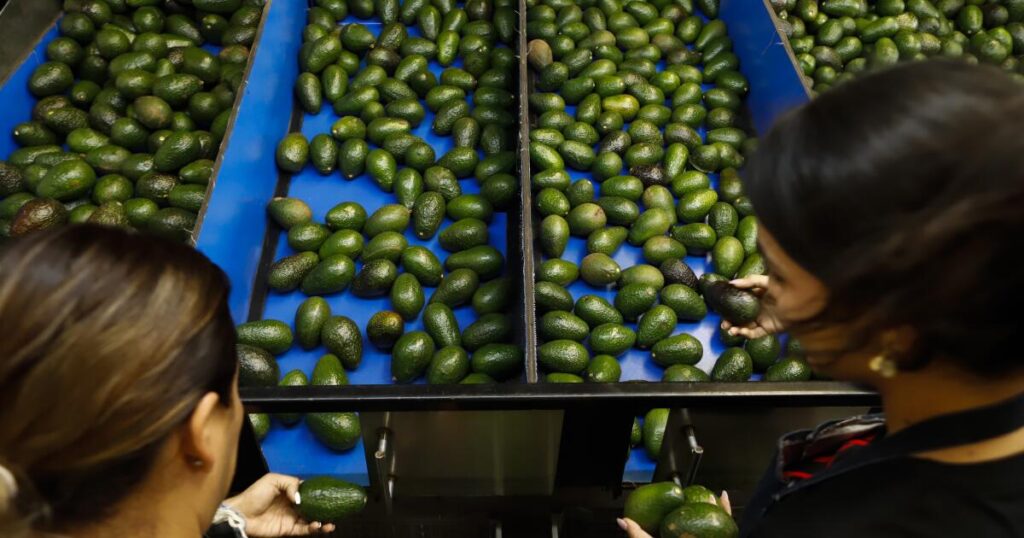Avocado shipments from Mexico to California may slow down in the coming days, which could make life difficult for guacamole and avocado toast lovers.
The U.S. Department of Agriculture said this week it had suspended inspections of avocados and mangoes imported from the violence-plagued Mexican state of Michoacán, a move that could ultimately lead to higher consumer prices.
U.S. Ambassador Ken Salazar said in a statement that the decision to stop inspections came after two USDA employees “were recently attacked and detained while inspecting avocados in Michoacán.” Salazar said the employees were no longer incarcerated, but he did not specify how they were released.
It’s unclear when inspections will resume. “These programs will remain on hold until the security situation is reviewed and protocols and safeguards are in place,” the USDA wrote in a statement to The Times on Tuesday. [Animal & Plant Health Inspection Service] personnel.
The move will not affect avocados and mangoes already shipped to the United States. Fruits and vegetables from other Mexican states are also not affected by the suspension, Salazar said.
While the U.S. did not provide further details on the nature of the incident, Michoacán Governor Alfredo Ramirez Bedola told Mexican radio that the incident began on Friday when a car carrying two people The inspector’s vehicle, along with other vehicles, was intercepted during the protest. The two inspectors were never in danger or detained and were on the road quickly, the governor said.
“This is not a crime against inspectors,” the governor said. Demonstrators in Mexico often block roads to protest against the government, organized crime or other entities. The governor expressed confidence that inspections will resume soon. Michoacan produces more avocados than any other state in Mexico.
“My administration is providing inspectors with all the security assistance they need,” the governor told Radio Formula.
This is not the first time U.S. safety inspectors have encountered problems in Michoacán, where the multibillion-dollar avocado industry has become a major target of cartels that impose heavy taxes on producers and grow their own The orchard is called “green gold” by locals.
More than a dozen criminal groups in Mexico are vying for control of the avocado trade, targeting wealthy orchardists, fruit pickers and drivers who transport the fruit north to the United States. Parts of Michoacán now resemble a veritable war zone, with criminal gangs possessing a formidable arsenal of weapons including grenade launchers, explosives-laden drones and so-called “monsters” equipped with machine gun turrets and steel armor. Tank-like vehicle.
U.S. inspectors often find themselves in a dilemma. Two years ago, the United States suspended avocado imports from Michoacán after threats were made against a factory safety inspector. Less than a week later, the ban was lifted. In December 2020, the United States halted avocado imports from a region in Michoacan state for a month after armed groups burned the fruits, Mexican officials said.
Salazar said he plans to travel to Michoacán next week to meet with Ramirez and Congress. Mexican producers and export packers address safety concerns.
Mexican President Andres Manuel Lopez Obrador said on Tuesday that his government was working with the United States to resume inspections.
“Fortunately, we have a good relationship and we are convincing them to do something different, but it will take time,” he said.
Avocados have become a staple in the diet of many Americans, who spread the creamy fruit on toast and mash it into guacamole. Experts say consumers benefit greatly from the efficient production of Mexican crops, both in their recipes and in their wallets.
In 2023, the United States imported a record 2.78 billion pounds of fresh avocados, 89% of which came from Mexico. California growers focus primarily on Hass avocados, which produce most of the fruit grown in the United States and account for about 10% of national consumption.
The California Avocado Commission estimates that California producers will grow 233.1 million pounds of avocados during the 2022-23 season. According to the U.S. Department of Agriculture’s outlook report released in March, officials expect production this season to be 208 million pounds, the lowest production since 2008.
Last year, fresh avocado imports totaled nearly $3 billion, ranking second among U.S. fresh agricultural product imports, second only to tomatoes.
Daniel Sumner, a professor of agricultural economics at the University of California, Davis, said the impact on consumers will depend on how long inspections are stalled.
“If it goes away quickly, it’s probably just a small blip in the market,” he said. “If this continues for a few weeks, we may see far fewer avocados.”
Sumner said if inspections remain suspended, people should prepare for an eventual increase in avocado prices. Stores and restaurants may also choose to stop buying fruit based on the wishes of their customer base, he said.
“It was natural. Things were rationed by price,” Sumner said.

